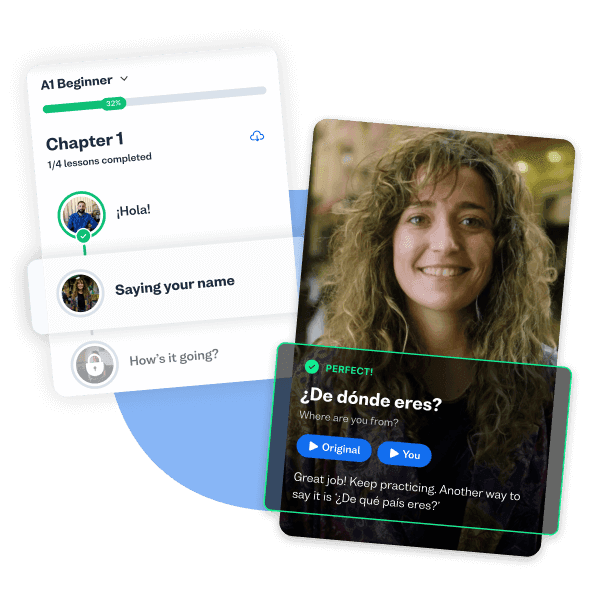I want to learn...
Author:

Barney Meekin
Learning vocabulary is one of the hardest parts of learning a language. Because languages have thousands and thousands of words. Words that — if you want to understand them — you need to know their meaning, their pronunciation, their spelling, and their antonyms and synonyms. That’s a lot to learn even for one word. Multiply that by all the words in a language, and it’s a huge challenge.
But it’s worth all the hard work. Expanding your vocabulary opens doors to new cultures, opportunities, and connections. In this article, you’ll learn all about the best ways to memorize vocabulary so you can boost your language learning.
The benefits of learning vocabulary
Knowing a wide range of vocabulary can give you a bunch of benefits. Let’s take a look.
Being able to choose from a wider range of words makes your communication more effective. You can find the right word for the right moment. You can always choose the word that communicates your message the most clearly. And your listeners never need to strain to understand what you say.
Multilingualism is valuable for modern businesses. That means people who speak more than one language are also valuable. You can use a strong vocabulary in multiple languages to increase professional opportunities, improve work conditions (including a higher salary), and advance your career.
When you learn vocabulary and improve your language skills, you can express yourself in another language. This is a huge achievement. One you should be proud of. And a sense of achievement like this boosts confidence, self-esteem, and motivation.
The more words you know about a range of topics, the more meaningful interactions you can have. Learning vocabulary means you can connect — and build relationships — with people from different backgrounds.
The science of memory and language
You can look at what science says about memory and language and apply the findings to your own language learning.
Let’s start at the beginning. Memory is the process of retaining information. To do this, your brain does three things: Encoding, storage, and retrieval. Encoding is the process of learning information. Storage is the process of storing information — your brain stores information in different amounts, in different places, and for different periods of time. And retrieval is the process of accessing stored information.
You have short-term — or working — memory and long-term memory. After encoding (learning) information, it goes into your short-term memory for a short (obviously) time. There are limits to how much information can stay in your short-term memory, and if you’re not careful, it’s easy to forget information here.
Your long-term memory has the capacity to store huge amounts of information for a long (obviously, again) time. When information goes in here, you need to recall it to access it — this is key for learning (more on this in a minute).
So how does this relate to learning vocabulary? Well, when you learn a new word, it goes into your short-term memory at first. But through repetition and practice these words move into your long-term memory. The goal when learning vocabulary is to find a way to move what you learn from your short-term to your long-term memory and then consolidate it. You do this by retrieving and recalling the word. For example, retesting your knowledge of vocabulary is proven to help you remember words.
The takeaway for language learners is that it isn’t enough just to memorize a word. You need to repeatedly access that word to really learn it.
Memorization and learning techniques for you to try
Alright, it all sounds very easy doesn’t it? Just move your new words from your short-term memory to your long-term memory and you’re done. It sounds easy but it won’t happen on its own. Here are some ways for you to help the process along.
1. Test, test, test
When you try to remember something, you fight against the forgetting curve. This is the natural process of forgetting something. Just after learning something, you can forget it surprisingly quickly. After a while forgetting slows down but still happens over time when you don’t recall or retrieve the information.
Testing is a great way to stop this process and is proven to help learning. I know, I know — everyone hates tests (me too). You don’t need to do formal tests. You don’t need scores or grades. And you don’t need to worry about passing or failing. Think of it like practice.
Here’s what you can do. Give yourself short, simple (and not stressful) quizzes to practice retrieving the information. That’s it.
2. Space things out
Spaced repetition — which combines well with testing — is another way to combat the forgetting curve. Spaced repetition is when you review the words you learn after a period of time. Some people like to do gradually increasing time periods (like a vocabulary review after 2 days, 7 days, 16 days, and so on) and others do it over set periods (like a review every three weeks). Spaced repetition leads to long-term learning of vocabulary so try both methods and see what works best for you.
3. Learn in manageable chunks
Languages have thousands of words. That's a crazy amount of information to try to learn, so why not break it down into manageable chunks? Break down the vocabulary you want to learn into smaller groups — how you do this is up to you. You could base your groups on the part of speech: Noun, verb, adjective, etc. Or you could do it by theme: Business words, art words, hobby words, etc. When you review and test the words, don’t do them one by one. Do them chunk by chunk.
4. Use mnemonics
Mnemonics are patterns, ideas, images, sounds, associations, or phrases that help you remember something. Think of it like this: You associate your new words with something you already know. This makes the new information more memorable. Here’s an example image association you could use. Let’s say you’re a Japanese learner. When you try to remember the hiragana characters, you could assign an image to each. The character め (me) kind of looks like an eye. This association makes it easier to remember the character.
5. Mix things up
Interleaving — the fancy word for learning multiple things or practicing multiple skills in a single session — is more effective for learning than blocked learning. With blocked learning, you learn one topic at a time. With interleaving, you mix things up. It’s another fantastic way to fight the forgetting curve.
For vocabulary learning, that could mean in any single session, doing more than one of the methods on this list. Every time you study vocabulary, include reading AND spaced repetition AND writing AND quizzes, for example.
Finding the right mix of these methods that works for you. Experiment. Reflect. And refine if necessary.
6. Use technology
Busuu’s machine learning technology helps you learn and retain vocabulary. Its spaced repetition algorithms fight against memory loss. Busuu Vocabulary Trainer automatically saves the words you come across in your courses. Its built-in quizzes are an effective and convenient way for you to test your knowledge. You get important active recall practice to combat the forgetting curve,
Every time you get a word right or wrong, the AI uses that information to further personalize your learning. So if you forget some, don’t worry — it helps the AI get a better picture of what you need. And you can use the Strengthen Vocabulary feature to review difficult words until you remember them.
Busuu Smart Review uses spaced repetition to help you remember vocabulary. The Smart Review tracks what you learn. It knows what you’ve studied, what you’ve remembered, and what you’ve forgotten. It looks at your native language to identify any natural difficulties with your new language. This information becomes the basis for a smart and personalized language course. With Smart Review, you review and retest the words you need to work on, at the perfect time to fight against the forgetting curve.
Memorize vocabulary and master your new language
There’s no doubt learning enough vocabulary to become fluent is a mammoth challenge. But if you follow the tips in the article, you’ll be on your way to having a huge vocabulary. These six methods take time and dedication but stick with it. Be consistent in your vocabulary study, and enjoy the process. Most importantly, find the method that works best for you.
AUTHOR

Barney Meekin
Newlanguages


